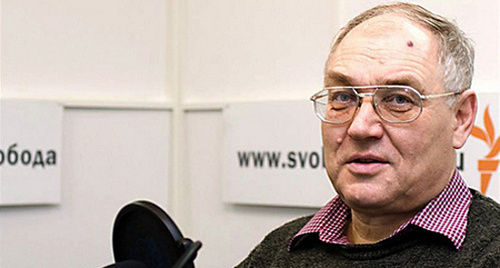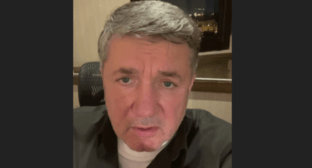
01 August 2014, 12:43
"Levada-Centre": events in Ukraine divert Russians' attention from Northern Caucasus
(Updated by the 'Caucasian Knot' on August 6, 2014, 7:09pm Moscow time)
The population of Russia is optimistic about the situation in Northern Caucasus, the polling data of the "Levada-Centre" indicates. Experts attribute this to the events in Ukraine. According to Lev Gudkov, the director of the "Levada-Centre", information about Northern Caucasus remains in the background and does not worry people.
The "Caucasian Knot" has reported that, according to the polling conducted by the "Levada Centre" on March 21-24, the population of Russia then enjoyed a surge of optimism in relation to the situation in the Caucasus. In the opinion of sociologists, the splash of optimism in March, as compared to the outcomes of the polling conducted on January 24-27, when the Russian society was pessimistic as to the prospects of the situation in Northern Caucasus, was caused by the Russia's annexation of the Crimea. According to the polling conducted on May 23-26, the population of Russia was still optimistic about the situation in Northern Caucasus; and this, according to sociologists, suggests that people's attention was switched over to Ukrainian events.
More than half of Russians are sure that the level of terrorism in Northern Caucasus has decreased through the last decade, the polling shows
According to the polling conducted by the "Levada Centre" on July 18-21, 2014, by a representative nationwide sampling of 1600 respondents from the urban and rural population aged 18 and older, residing in 134 settlements of 46 regions of the country, Russian residents are still sticking to the idea of stabilization of the situation in Northern Caucasus that arose in March.
53% of respondents believe that the level of terrorism in Northern Caucasus went down during the last 10 years (a year ago, in June 2013, the figure was 40%); 29% believe that it has remained the same (in 2013, there were 33% of such respondents); and 9% believe that it has increased (in 2013, there were 19% of such respondents).
The concern about the "export" of terrorism to other regions has gone down as well: in 2013, 49% of respondents were seriously concerned; now – 29%.
64% of respondents now believe that the federal authorities are completely or largely controlling the situation in Chechnya (in 2012-2013, the figure was 48%).
Even in such sensitive issue like the efficiency of spending the funds sent from the federal centre to the republics of Northern Caucasus, respondents have revealed optimism: the number of those who believe that the funds are mostly embezzled is now 19% (last year, there were 28% of them); and the number of those who believe that the funds are spent as effectively as in other regions has went up from 15 to 22%.
55% of respondents believe that Northern Caucasus pursues the proper policy (in June 2013, 40% stuck to this idea); and only 7% believe that the policy of the authorities in the region is too tough (this figure remains virtually unchanged from last year).
Russians remain optimistic about the future of the region: 19% of respondents believe that the situation there will improve over the next year (in January, only 9% supported this idea); 58% believe that it will remain unchanged (this figure remains virtually unchanged since January, with account of the admissible statistical error of 3.4%); and only 9% believe that it will get worse (in January, the figure was 21%). 25% of respondents believe that the region will be able to build up a peaceful life over the coming years (in 2013, there were 10% of such optimists).
The number of those who believe that peaceful life in Northern Caucasus is possible, but it is a long-term process has gone up from 31% to 37%; while the number of those who chose the answer "I think that this will fail whatsoever; and Chechnya will remain a source of tension and conflicts in Russia for decades" went down from 37% to 19%. 7% of respondents found secession of the Caucasian republics possible.
A number of questions of the latest polling focused on the beginning of the second war in Chechnya in 1999. While in 1999, the main perpetrators of unleashing the war, according to the interviewed Russians, were the then Russian President Boris Yeltsin (36%), followed by Chechen militants (25%), Chechen leadership (22%), Russian leadership (20%) and the Government of Russia (18%), in 2014, the situation has changed. Now, according to the respondents, the main perpetrators of the war are Chechen militants (41%), followed by Chechen leadership (20%), while President Yeltsin, Russian leadership and Russian Government have scored 19%, 10% and 6%, accordingly.
The opinion that there was no reason for deployment of troops in Chechnya in 1999, and it was just enough to close the border, was supported by the majority of respondents. Now, only 29% of respondents approve the use of troops (against 46-50% in early 2000s); and 42% believe that it was enough to close the border (in 2000, the figure was about the same). However, now 42% of respondents support the decision to start the counterterrorist operation (CTO), while the majority (55%) sticks to the opinion that civilian casualties during the CTO were not justified.
Gudkov: in the prospect of big war, Russians feel that situation in Northern Caucasus is calm
In the opinion of Lev Gudkov, the Director of the "Levada Centre", the high level of approval of the current policy of Russian authorities in the Caucasus, observed since March, is a consequence of the situation in Ukraine.
"Then, the anti-Maydan, anti-Ukrainian and anti-Western propaganda got into play; and it squeezed off all the information about the developments in Northern Caucasus. Although clashes with militants continue there, this information remains in the background and does not disturb people. In the prospect of a large-scale war – either with Ukraine or with the rest of the world – local events just fail to get into the field of view. Therefore, there is a feeling that there are no problems there; and the situation in Northern Caucasus is calm," Lev Gudkov told the "Caucasian Knot" correspondent in his comment on the polling results.
The change of Russians' viewpoint regarding the perpetrators of the second Chechen war seems quite natural to Gudkov.
"In 1999, the memories of the first Chechen war were quite fresh. The first war (the second – to a lesser extent) was perceived as an injustice, which had to be stopped at all costs; and, therefore, the authorities' guilt was believed high. Now, Putin himself and his government have been withdrawn out of criticism by the state-owned mass media; and all the responsibility is put on Chechens," the Director of the "Levada Centre" has emphasizes.
According to his version, such substitution is not a single phenomenon. "Now, a similar situation with substitution is observed in relation to early years of the Great Patriotic War. During the perestroika, the emphasis was on Stalin's negative role and repressions in the army; now, along with rehabilitation of Stalin, they increasingly switch to the unexpectedness of Germans' attack," said Gudkov.
According to Gudkov, both the first and the second Chechen wars had been considered in Russia as unfair; therefore, 65-70% of the population had negative attitude to them.
"The only period, when the revenge moods dominated, was in 2000-2001. And later, when the situation began to grow dim; and it became clear that no rapid success is possible, it all came back to earlier positions that it would have been better to close the border, or just to let Chechnya to float away freely," said Lev Gudkov.
His deputy Alexei Grazhdankin has also noted that, although the improvement of the image of Northern Caucasus in public eyes began in 2012, a decisive breakthrough, which began in March this year, had to do with the events in Ukraine.
"The events in Ukraine have changed the perceptions of an ordinary Russian of what is good and what is bad. As compared to Ukraine, Northern Caucasus looks a calmer region," said Alexei Grazhdankin.
In his opinion, as regards the second Chechen war, over the past 15 years we saw what can be treated as the "blurring of responsibility" of the Russian leadership and imposition of responsibility for the outbreak of war on Chechens.
Grazhdankin associates the change of Russians' opinion regarding the actions of power agents in Chechnya with numerous victims among the civilian population. "After the completion of the active phase of the CTO, the view became prevailing that it could have been conducted more peacefully – by isolating Chechnya and achieving same results through a long siege. Now, same as 15 years ago, the casualties of the CTO from among the civilian population of Chechnya are regarded as unjustified," said Alexei Grazhdankin.
Author: Semyon Charny Source: CK correspondent




